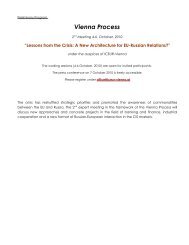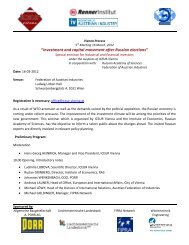Address - International Center for Advanced and Comparative EU ...
Address - International Center for Advanced and Comparative EU ...
Address - International Center for Advanced and Comparative EU ...
Create successful ePaper yourself
Turn your PDF publications into a flip-book with our unique Google optimized e-Paper software.
Michael LÖWY<br />
Current Developments in Austria <strong>and</strong> the CEE<br />
Michael LÖWY<br />
Current Developments in Austria<br />
<strong>and</strong> the CEE<br />
I. The current development in Austria<br />
Necessary optimism aside, it is highly likely that the full impact of the crisis will be felt only in 2010, since a<br />
sustainable uptick is not in sight. Staggering challenges <strong>for</strong> our enterprises, the workers <strong>and</strong> employees in<br />
the private economy <strong>and</strong> politics will remain also during the following year.<br />
What is the status quo of the country during the worst recession in 70 years<br />
Different branches of the Austrian economy were affected differently. While the export-oriented<br />
industries are just beginning to emerge from the state of shock caused by the Great Recession, retail<br />
trade has remained stable to date. Nevertheless, the crisis has engulfed additional branches <strong>and</strong><br />
enterprise categories.<br />
While the increase of purchase power of private households in 2009 (generated by high wage increases<br />
during the preceding year in t<strong>and</strong>em with a strong deflationary process <strong>and</strong> the positive effects of the tax<br />
re<strong>for</strong>m) had stabilized private consumption, this effect has been levelling off in the meantime.<br />
At the same time, the situation of industrial enterprises continues to be difficult given the<br />
underutilization of capacities <strong>and</strong> the pressure on returns resulting from such. Consequently, the<br />
propensity to invest has remained on a low level <strong>and</strong> the employment situation is gloomy. The<br />
economically most difficult phase is yet to come, particularly in consumer-orientated sectors.<br />
The most imminent risk lies in the failure to achieve a sustainable upswing after the numerous one-time<br />
effects from the stimulus packages have abated. In order to achieve recovery, further ef<strong>for</strong>ts are<br />
necessary. Also, the homework in terms of re-structuring has to be done.<br />
The first year of the Austrian government under Federal Chancellor Werner Faymann <strong>and</strong> Vice Chancellor<br />
Josef Pröll was marked by getting a h<strong>and</strong>le on the crisis. The results were rather impressive: For one thing,<br />
the financial meltdown was prevented in an internationally concerted ef<strong>for</strong>t <strong>and</strong> the impact of the Great<br />
Recession on the real sector was mitigated by numerous interventions. This certainly was <strong>and</strong> is a success.<br />
Yet, what is the outlook <strong>for</strong> the coming year<br />
One thing is clear, the crisis has not been overcome yet. Authorities worry that the level of income <strong>and</strong><br />
production of 2008 will be reached no earlier than 2012. In this perspective, the re<strong>for</strong>m options yielded by<br />
the crisis have not been wasted, although a much higher ground speed is necessary. It is imperative to prime<br />
the pump <strong>for</strong> enhanced competitiveness of Austria as a location <strong>for</strong> industry. A smart economic policy will<br />
invest in the conditions which warrant an optimal participation in the coming economic upturn.<br />
For Austria in 2010, this, among other things, implies the following:<br />
The most <strong>for</strong>midable task, not only <strong>for</strong> the coming year, but the entire next decade, will be budget<br />
consolidation. Structural re<strong>for</strong>ms must be initiated now, in order to make consolidation possible by<br />
2011.<br />
Additionally, growth has to be stimulated. A sufficiently high growth rate goes with increased<br />
employment <strong>and</strong> tax returns. Despite the crisis, an additional growth corridor has to be opened in terms<br />
of expenditure <strong>for</strong> research <strong>and</strong> development, including an increase of the research premium to 12% <strong>and</strong><br />
a special package <strong>for</strong> lead enterprises. Investment in infrastructure across the board is absolutely<br />
necessary!<br />
Social security systems are in need of an incentive-based trans<strong>for</strong>mation. Regarding the pension system,<br />
the retirement age must be raised.<br />
What is abundantly clear is that budget consolidation will fail without growth. We We must there<strong>for</strong>e try<br />
to return to a growth trajectory as swiftly as possible. Admittedly, the prospects <strong>for</strong> rapid <strong>and</strong> significant<br />
growth are far from bright.<br />
IC<strong>EU</strong>R-Vienna Working Papers 2|2009 17









